Local footy: How small community clubs are battling for survival
Several smaller community football clubs will be vulnerable in coming months as the true toll of the coronavirus crisis is revealed. But how can they safeguard their futures amid constant uncertainty? LUKE D’ANELLO finds out.
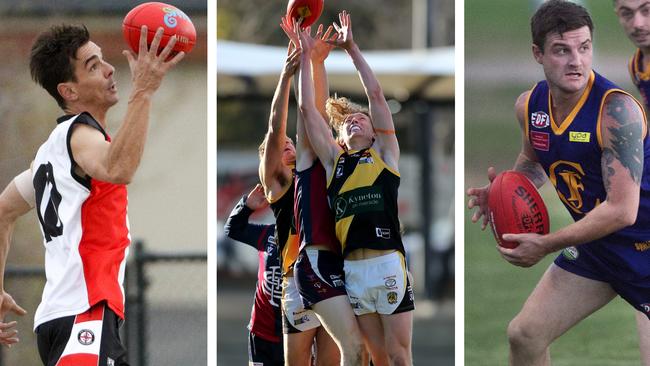
Local Footy
Don't miss out on the headlines from Local Footy. Followed categories will be added to My News.
For every community football club in a strong financial position to survive the impact of the coronavirus crisis, countless others are contemplating the dire prospect of shutting the doors before competitions can resume.
Six months of hard labour over pre-season was frustratingly erased when leagues made the only call they could – cancel the 2020 season and reset for 2021.
But only in the months and years ahead will the true toll of the pandemic on local clubs become evident.
There is more uncertainty than ever with Victoria under stage four restrictions until September – a month normally associated with thrilling finals matches and the ecstasy of premiership success.
Clubs have suffered a collapse in sponsorship and are unable to generate game-day revenue to cover the costs they absorbed to prepare for a season that was ultimately canned.
Some have become more creative than ever, turning online to raise funds, but the inability to have people gather at clubs – and anywhere else – is a giant financial obstacle.
“We’re always worried about it,” North Sunshine president Robert Telfer said when asked if there were fears the Western Region Football League club would go into recess.
“With the situation we found ourselves in and to have that turning around, everything with positive, we had more people on board and that obviously means more income for the club, and we can pay our debts.
“But how do you maintain that? It’s not like we can even say, ‘Come to a club function’ because we can’t hold a club function.”
The Roadrunners have struggled on the field in the WRFL for several years.
They won nine games in 2017, just missing finals, but the 2016 and 2018 campaigns delivered just three wins each, while the Division 3 club went through 2019 without a victory.
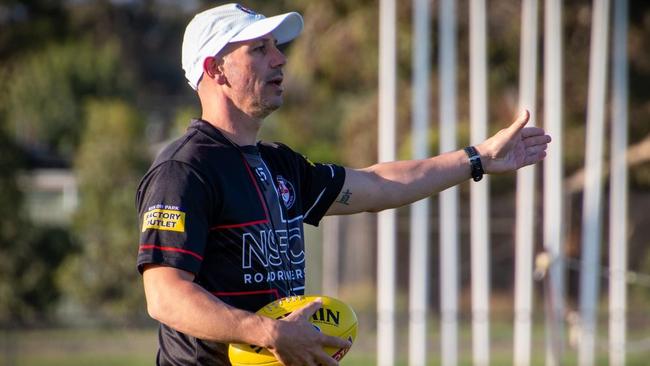
There was little doubt North Sunshine was set for a more productive 2020, with 51 players attending pre-season training under new coach Ange Messina before the cancellation.
In March last year, it had nine senior players at sessions.
Enthusiasm was rife before “coronavirus came along and derailed that”.
“That just shows the turnaround in the club,” Telfer said.
“One of the challenges now is keeping everyone keen during an off-season, even though there hasn’t been a season.”
Telfer said small fundraisers such as Thursday night dinners after training made “a big difference” for small clubs.
Out at Jacana, 2020 was meant to be a season of triumph.
Expectations were low on field, but the Jaguars were on track to field a senior team in the Essendon District league after spending most of the 2019 campaign in recess amid financial troubles and a crippling player exodus.
Club spokesman Frank Gough said Jacana, which has produced VFL/AFL champions Chris Johnson, Bruce Doull and Scott Wynd, was “gaining a bit of momentum”.
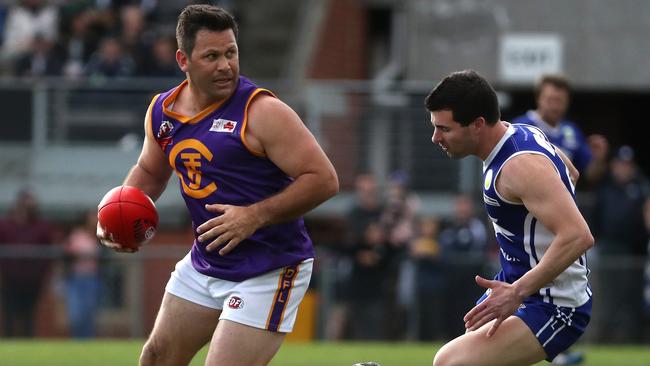
The Jaguars had 22 players on their books when the season was scrapped – a low number by comparison with rival clubs but a positive result compared to the previous year.
“I don’t think a lot of people know how bad this situation is and how far it’s going to go,” Gough said.
“If it goes till Christmas, who knows?”
Asked if there was a chance his club could fold, Gough said: “We’re hoping not. We’ve still got a good dozen people who are willing to do things to help the club.
“We’ve got a good, strong committee, the coach (Glenn McIntyre), the trainers. If we do get up and running (and have a season in 2021), that’s the best thing that can happen for us.”
Hope is all Jacana’s ardent supporters have right now.
Hope that next season will get off the ground and hope all the hard work will ultimately pay off.
“We’re not giving up,” Gough said.
“It’s more like a bit of a holiday at the moment until this thing goes. If it gets better, we’ll start talking to people and the council, and we’ll sort things out.
“We’re not giving in. We’ll get the players back
“Once we can use the ground, the clubrooms, a lot of action will take place.”
The Jaguars need only look to Keilor Park for inspiration.
While COVID-19 was not around in 2018, the Devils spent the EDFL season on the sidelines in a bid to rebuild.
They copped several heavy losses last year, but are now in a position to push on with purpose.
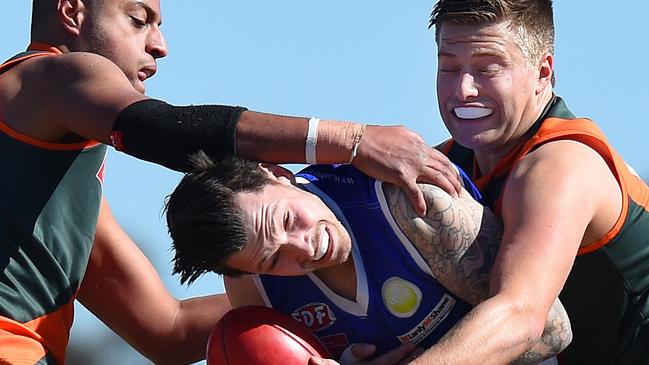
“We’re looking good for next year,” president Shannon Rogers said.
“We’ve lost a few sponsors but still maintained most of it. Financially, we’re pretty stable at the moment.”
Rogers said Keilor Park would retain the bulk of its players, with more expected to join in coming months.
He said the constant uncertainty had been the most difficult part.
“We did a lot of planning and were looking at doing a lot of things this year and obviously they haven’t come to fruition,” Rogers said.
The 1990 and 2001 premiership reunions have been postponed until next year as the club’s volunteers continue to work hard to raise funds.
Bendigo league club Kyneton could be seen as vulnerable given it is not yet debt free.
But the Tigers have worked diligently to reduce a $200,000 black hole to $40,000 in the past two years on the back of a hugely successful raffle.
Kyneton went into recess in 2013, but it is confident the future is bright.
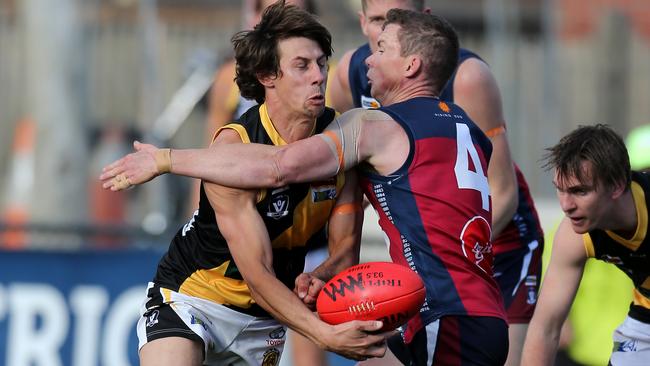
“Financially, I feel we’re in a better position than we have been for five or so years,” president Julie Priestley said.
“We’ve been all working hard on the committee.
“We’re just making sure everyone stays safe and ensuring we keep the club safe as well.”
Salary caps will be slashed by about 50 per cent in local leagues for the next three years to help safeguard clubs’ futures.
Sadly, however, there is a chance some will not make it that far.
“We want the club to prosper, be viable and remain operational so the next generation who are a family or a player can be part of any club in the next 10 or 20 years,” ex-Collingwood star and three-time Keilor premiership coach Mick McGuane said.
“If (clubs) think they can survive this and outlandishly not save costs or suppress the money you need to stay viable, they might be extinct in the next two or three years. They’ll have to be managed really well.
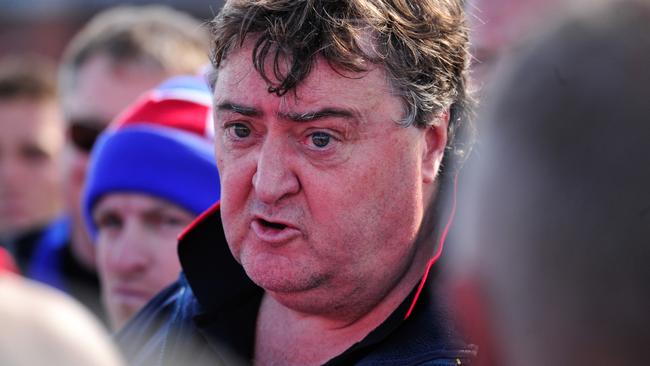
“They have to understand if there’s a salary cap of 50 (thousand), you don’t have to spend 50. You can spend 30 to save your coffers.
“Greed can often kill. If we lose two or three clubs that try to remain viable … it just will destroy competitions.”
It was reported last month that a quarter of community sports clubs across the country are battling to stay afloat.
A national study by the Australian Sports Foundation found 1600 clubs were at risk of folding in the next six months unless they secure emergency funding.
MORE LEADER LOCAL FOOTY NEWS
THE COACHING POSITIONS UP FOR GRABS IN LOCAL FOOTY
WHY LOCAL FOOTY CLUBS ARE ABOUT TO SNARE QUALITY COACHES
WHAT TO LOOK FORWARD TO IN THE EDFL IN 2021
